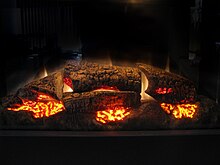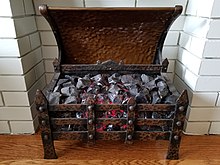| This article needs additional citations for verification. Please help improve this article by adding citations to reliable sources. Unsourced material may be challenged and removed. Find sources: "Electric fireplace" – news · newspapers · books · scholar · JSTOR (June 2017) (Learn how and when to remove this message) |

An electric fireplace is an electric heater that mimics a fireplace burning coal, wood, or natural gas. Electric fireplaces are often placed in conventional fireplaces, which can then no longer be used for conventional fires. They plug into the wall, and can run on a "flame only" setting, or can be used as a heater, typically consuming 1.4 to 1.6 kW to heat a 40 m room.
History

The electric fire was invented in 1912 and became popular in the 1950s. Electric fireplaces found in 1950s homes were typically small and could be easily moved.
Techniques for electrical "flame effects" have been around since at least 1981.
Commercial electric fireplace techniques include the Optiflame, introduced in 1988 by Dimplex.
Dimplex claims to have produced the first electric fireplace with a "realistic" wood-burning flame effect in 1995. It is unclear what specific technique is being referred to, although it may be U.S. patent 5,642,580.
In 2008 Dimplex launched the Opti-myst effect which simulates both flames and smoke.
In 2013 Dimplex launched the Opti-V effect which combines realistic flickering flames with three dimensional LED logs that sporadically sparks and an audio element of crackling logs.
Technology
Heating techniques
Many electric fireplaces have heating coils that produce heat as electricity flows through it. The heated air is propelled out into open space by a fan. Other heating techniques used in electric fireplaces include PTC ceramic heating and infrared technology.
Controls
Electric fireplaces are typically controlled by a remote or a set of buttons in which the temperature, lighting, and flame effects can be controlled. Some electric fireplaces are connected to an app in which the controls can be changed from the user's cell phone.
7 Colors LED Flame
Electric fireplaces feature 7-color LED flame technology, allowing users to choose from a variety of colors for a customizable ambiance. With adjustable flame heights, they offer flexibility in creating the perfect setting, while their long-lasting durability ensures a reliable, low-maintenance heating solution.
Advantages compared to traditional fireplaces
Advantages of electric fireplaces are that they:
- do not require chimneys.
- are often portable.
- do not require remodeling to install.
- are more economical.
- are more convenient.
- are safer to use (no risk of catching fire, inhaling smoke or gas, or overheating).
- can be installed without professional assistance.
- are better for the environment than wood burning and gas fireplaces.
- do not require the maintenance needed for wood burning or gas fireplaces.
- Electric fireplaces, unlike traditional ones, offer smart features and customization
Disadvantages compared to traditional fireplaces
Disadvantages of electric fireplaces are that they:
- can be more expensive to operate in rural areas compared to gas or wood burning heaters due to price of electricity.
- are sometimes not as realistic as real flames, even those in gas fireplaces. Additionally, they can lack other sensual cues of a real fire like the smell of burning wood, or crackle of a burning log.
See also
Reference
- Museums. "08. Electric fire Museums". www.northamptonmuseums.com. Retrieved 2023-12-09.
- "A BRIEF HISTORY OF ELECTRIC APPLIANCES". Localhistories.org. Retrieved 29 April 2015.
- "Heating the house with electric fires in the 1940s and 1950s". 1900s.org.uk. Retrieved 29 April 2015.
- "When electricity started being used for heating houses". www.1900s.org.uk. Retrieved 2023-10-26.
- U.S. patent 4,253,045
- "About Dimplex". Dimplex. Archived from the original on January 20, 2007. Retrieved 29 April 2015.
- "How Do Electric Fireplaces Work". Electric Fireplaces Direct. Retrieved 2023-12-09.
- "7-color LED flame technology fireplace".
- Karlsson, Bodil S. A.; Håkansson, Maria; Sjöblom, Jonas; Ström, Henrik (2020-11-01). "Light my fire but don't choke on the smoke: Wellbeing and pollution from fireplace use in Sweden" (PDF). Energy Research & Social Science. 69: 101696. doi:10.1016/j.erss.2020.101696. ISSN 2214-6296.
- Fireplace vs. Fireplace Insert
- "Electric Fireplace Benefits".